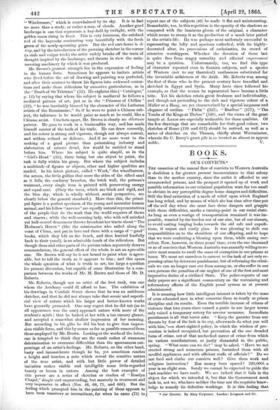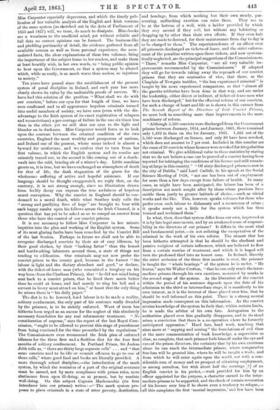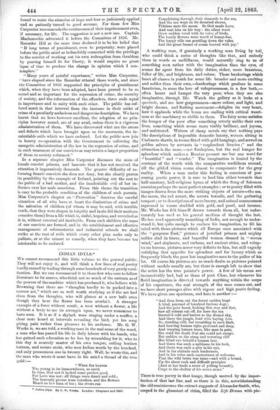BOOKS.
. OUR CONVICTS.*
THE cessation of the annual flow of convicts to Western Australia is doubtless a far greater present inconvenience to that colony than to the mother country, since the outlet it afforded to our overcrowded prisons, and the prospect it opened up of work and possible reformation to our criminal population were far too small to obviate in any perceptible degree home dangers and difficulties. Still the final extinction of a mode of relief upon which England has long relied, and by means of which she has time after time put off the evil day when she must face those dangers and grapple with those difficulties, marks a turning-point in our social state. As long as even a vestige of transportation remained it was im- possible, wearied by the burden not of our sins, but of our sinners, to avoid casting longing looks towards the old safe and expedi- tious, if unjust and costly plan. It was pleasing to shift our responsibilities on to the shoulders of our offspring, and to hope that we were conferring a blessing upon them, while easing our- selves. Now, however, in three years' time, even the one thousand or so of convicts that Western Australia was annually willing to re- ceive must remain to swell the mass of corruption in our prisons at home. We must set ourselves in earnest to the task of not only re- pressing crime by deterrent punishment, but of reforming the crimi- nals we can no longer cast out from among us, or else suffer in our own persons the penalties of our neglect of one of the first and most imperative duties of a civilized State. The police-reports of our daily papers are a significant commentary on the restraining and reformatory effects of the English penal system as at present administered.
It is amazing how little intelligent interest is taken by the mass of even educated men in what concerns them so nearly as prison discipline and its results. Even the terrible increase of crimes of violence that two years since caused a panic in our larger towns only raised a temporary outcry for severer measures. Immediate punishment is all that terror asks. "Keep the garotter from our throats by fear of the lash is its cry, afterwards do what you will with him,"—a short-sighted policy, in which the wisdom of pre- vention is indeed recognized, but prevention of the one dreaded form of crime, not of that unchecked career of crime from which its various manifestations, so justly distasteful to the public, spring. "What more can we do ? " may be asked. "Have we not erected strong and numerous prisons, furnished them with all needful appliances and with efficient staffs of officials?" Do we not feed and clothe our convicts well? Give them work and religious instruction? Has money been spared? 220,000/. a year is no slight sum. Surely we cannot be expected to guide the vast machine we have made. We see indeed that it fails in the object for which we intended it, but that the Government must look to, not we, who have neither the time nor the requisite know- ledge to remedy its defective workings. It is this feeling that • Ow Convicts. By Mary Carpenter. London: Longman and Co.
Miss Carpenter especially deprecates, and which the timely pub- lication of her valuable analysis of the English and Irish versions of the same system (as sketched out in the Acts of Parliament of 1853 and 1857) will, we trust, do much to dissipate. Blue-books are a weariness to the unofficial mind, yet without reliable and full data no correct opinions can be formed. The business-like and plodding pertinacity of detail, the evidence gathered from all available sources as well as from personal experience, the accu. mulated facts, the clear explanations of these two volumes, bring the importance of the subject home to her readers, and make them at least heartily wish, in her own words, to "bring public opinion to bear upon the Government, so that a system may be altered which, while so costly, is so much worse than useless, so injurious to society."
Ten years have passed since the establishment of the present system of penal discipline in Ireland. and each year has more clearly shown its value by the undeniable proofs of success. We have had this solution of the problem "What shall we do with our convicts," before our eyes for that length of time, we have seen confirmed and to all appearance hopeless criminals turned into useful members of society, we have seen (even with the dis- advantage to the Irish system of its exact registration of relapses and reconvictions) a per-centage of failure in the one six times less than in the other, yet we still shut our eyes to the light and blunder on in darkness. Miss Carpenter would force us to look upon the contrast between the criminal condition of the two countries, England the most wealthy and prosperous of nations, and Ireland one of the poorest, whose name indeed is almost a byword for misfortune, and we confess that to turn from her first volume, in which the English system and its results are minutely traced out, to the second is like coming out of a death- vault into the cold, bracing air of a winter's day. Little sunshine greets us, it is true, but we have exchanged an atmosphere of death for that of life, the dank stagnation of the grave for the wholesome suffering of active and hopeful existence. If our language should be thought exaggerated, we reply that, on the contrary, it is not strong enough, since no illustration drawn from bodily decay can express the true awfulness of hopeless moral corruption. Why the convict in England should be con- demned to a moral death, while what Southey truly calls the "strong and purifying fires of hope" are brought to bear with such happy results upon his fellows across the Irish Channel, is a question that has yet to be asked so as to compel an answer from those who have the control of our convict prisons.
It is not necessary to follow Miss Carpenter in her minute inquiries into the plan and working of the English system. Some of its most glaring faults have been remedied by the Convict Bill of the last Session. Perhaps in future we shall not be able to recognize discharged convicts by their air of easy idleness, by their good clothes, by their "looking fatter" than the honest and hardworking labourers around them, a state of things not tending to edification. Our criminals may not now prefer the convict prison to the county gaol, because in the former "the labour is light and the dietary abundant and good," or declare, with the ticket-of-leave man (who committed a burglary on his way home from the Chatham Prison), that "he did not mind being sent back to a convict prison, that he lived there much better than he could at home, and had merely to ring his bell and a servant in livery must attend on him," or boast that the only thing he misses there is "his daily paper."
The diet is to be lowered, hard labour is to be made a reality, solitary confinement, the only part of his sentence really dreaded by the prisoner, is to be strictly enforced. Want of room has hitherto been urged as an excuse for the neglect of this absolutely necessary foundation for any real reformatory treatment. "No consideration of expense," says the report of the last Royal Com- mission, "ought to be allowed to prevent this stage of punishment from being continued for the time prescribed by the regulations." The Commissioners even recommend the Irish plan of enforced idleness for the three first and a ileshle.ss diet for the four first months of solitary confinement. In Portland Prison, Sir Joshua Jebb tells us, "there are thirty large separate cells" . . . and "that some convicts used to be idle or commit offences to go to one of these cells," where good food and books are liberally provided. A more thorough school discipline,—the introduction of the mark system, by which the remission of a part of the original sentence must be earned, not by mere compliance with prison rules, mere abstinence from open ill-doing, as at present, but by resolute well-doing. On this subject Captain Machonochie (its first introducer into our prisons) writes :•—" The mark system pro- poses to place criminals in a state of utter poverty, destitution, and bondage, from which nothing but their own steady, per- severing, unflinching exertion can raise them. They are to be at the bottom of a well, with a ladder provided by which they may ascend if they will, but without any bolstering or dragging up by other than their own efforts. If they even halt they are made to descend, for their maintenance from day to day is to be charged to them." The superintendence of an officer over all prisoners discharged on tickets-of-leave, and the strict enforce- ment of the penalties written upon those tickets, and now systema- tically neglected, are the principal suggestions of the Commissioners. "These," remarks Miss Carpenter, "are all very valuable im- provements recommended by the Commissioners." If adopted they will go far towards taking away the reproach of our convict prisons that they are seminaries of vice, that there, as the Chaplain of Newgate testifies, "the less experienced criminal" is taught by his more experienced companions, so that "almost all the garotte robberies have been done in that way, and are under the leadership, either direct or indirect, of ticket-of-leave men who have been discharged," but for the effectual reform of our convicts, for such a change of heart and life as is shown in this extract from The Seventh Report of the Directors of Irish Convict Prisons, we must look to something more than improvements in the mere machinery of reform.
"Although 5,560 convicts were discharged from the Government prisons between January, 1854, and January, 1861, there remained only 1,492 in them on the 1st January, 1861. 1,462 out of the 5,560 were discharged on licence, and only 89 have been revoked, which does not amount to 7 per cent. Included in this number are the eases of 30 convicts whose licences were revoked for irregularities not criminal. We give additional value to these statistics by stating that we do not believe a case can be proved of a convict having been reported for infringing the conditions of his licence and still remain- ing at large in this country." "Of sixty discharged prisoners now in the city of Dublin," said Lord Carlisle, in his speeell at the Social Science Meeting of 1858, "not one has been out of employment for more than a few days except from failure of health. In many cases, as might have been anticipated, the labour has been of a description not much sought after by those whose previous lives entitle them justly to greater latitude of choice,—such as vitriol works and the like. This, however, speaks volumes for those who prefer even such labour to dishonesty and a recurrence of crime ; it speaks surely not a little for the system which has thus trained and reclaimed them."
In what, then, does that system differ from our own, improved as it is by late legal enactments, and by an awakened sense of responsi- bility in the directors of our prisons? It differs in the most vital and fundamental point,—in not enlisting the co-operation of the criminal in the work of his own reform. The utmost that has been hitherto attempted is that he should be the obedient and passive recipient of certain influences, which are believed to flow from a certain routine of treatment, and which it is hoped will turn the professed thief into an honest man. In Ireland, directly the strict seclusion of the three first months is over, the prisoner is taught the "whole bearings" of the system he is under. "He learns," says Sir Walter Crofton, "that he can only reach the inter- mediate prisons through his own exertions, measured by marks in the second stage of the system. As the liberation of the convict within the period of his sentence depends upon the date of his admission to the third or intermediate stage, it is manifestly to his own interest, as it is the interest of those placed over him, that he should be well informed on this point. There is a strong mental impression made consequent on this information. As the convict attains knowledge of the system he feels that, within certain limits, he is made the arbiter of his own fate. Antagonism to the authorities placed over him gradually disappears, and in its stead arises a conviction that there is a co-operation where he formerly anticipated oppression." Hard fare, hard work, teaching that aims more at "sapping and mining" the foundations of evil than at the mere communication of book knowledge, a supervision so close, so complete, that each prisoner feels himself under the eye and care of the prison directors, the certainty that by his own exertions alone he can reach the intermediate prisons, where comparative freelom will be granted him, where he will be taught a trade, and from which he will enter again upon the world, not with a con- siderable sum of money and no prospect of obtaining employment, as among ourselves, but with about half the earnings L?] of an English convict in his pocket,—work provided for him by an officer appointed for the purpose, a character earned in the inter- mediate prisons to be supported, and the check of certain revocation of his licence over him if he shows even a tendency to relapse,— all this completes the first 'mental impression,' and few have been
found to resist the stimulus of hope and fear so judiciously applied and so patiently turned to good account. For those few Miss Carpenter recornmPads the continuance of their imprisonment even, if necesaary, for life. The suggestion is not a new one. Captain Machonochie advocated it before the Committee of 1856. Mr. Recorder Hill at the same time declared it to be his belief that "H long terms of punishment, even to perpetuity, were placed before the public mind as indissolubly connected with the privilege to the convict of working out his own redemption from thraldom by proving himself fit for liberty, it would require no great lapse of time to produce the change in opinion which I con- template."
"Many years of painful experience," writes Miss Carpenter, "have elapsed since the Recorder uttered these words, and since the Committee of 1856 supported the principles of punishment which, when they have been adopted, have been proved to be so sound and so important for the repression of crime, the security of society, and the reformation of the offenders, three ends equal in importance and in unity with each other. The public has suf- fered much in that interval from the increase in their midst of crime of a peculiarly audacious and dangerous description. We have learnt that no laws however excellent, the adoption of no prin- ciples however sound, are of any avail, unless there is a vigorous administration of them. We have discovered what are the errors and defects which have brought upon us the enormous, the in- calculable evils which we have endured. Let the public now join in hearty co-operation with the Government in enforcing the energetic administration of the law in the repression of crime, and in such treatment of our convicts as may return a larger proportion of them to society reformed."
In a separate chapter Miss Carpenter discusses the state of female convict prisons, and laments that it has not received the attention it imperatively demands. The greater difficulty of re- forming female convicts she does not deny, but she clearly proves its possibility by the example of Ireland, pointing out the cost to the public of a bad mother, and the incalculable evil of her in- fluence over her male associates. From this theme the transition
is easy to the probable condition of the children of such parents.
Miss Carpenter's chapter on " Prevention " deserves the careful attention of all who have at heart the diminution of crime and
the salvation of children (of whom it may be said, with terrible truth, that they were shapen in iniquity and in sin did their mothers conceive them) from a life which is, sinful, hopeless, and wretched as it is, without external aid inevitable. From such children the mass of our convicts are formed, and in the establishment and effective management of reformatories and industrial schools we shall strike at the root of evils which every other plan seeks only to palliate, or at the utmost to remedy, when they have become too intolerable to be endured.
































 Previous page
Previous page